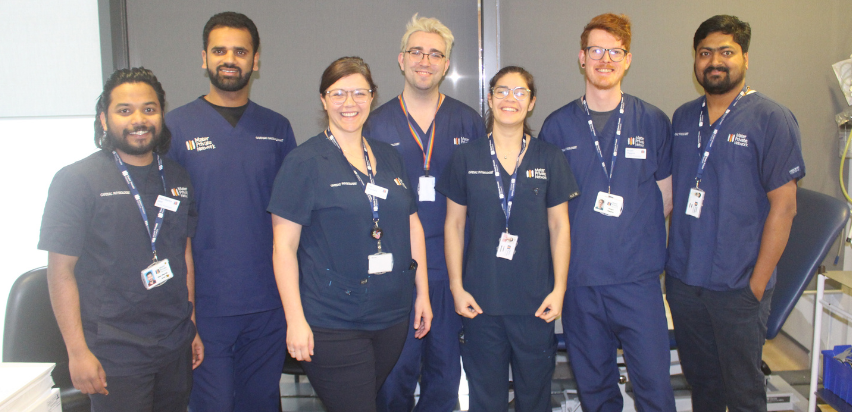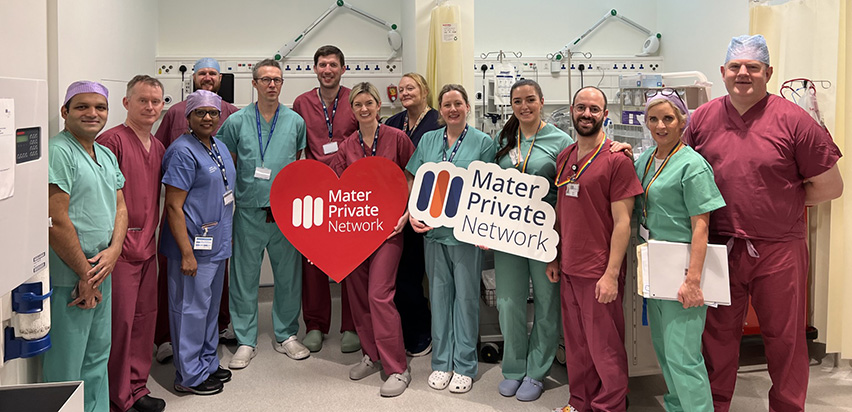15th April 2024
Meet The Team - Cardiac Physiologists
Health and Social Care Professionals (HSCP) play a very important role in patient care across Mater Private Network. HSCP teams provide social and therapeutic care, and diagnostic tests for patients across all our healthcare settings. Their knowledge and skills are vital for diagnosis and treatment of a wide range of health issues.
We recently met with the Cardiac Physiology team in Mater Private Network Cork to understand more about their role within the Heart & Vascular service at the hospital.

Dee Drysdale - Chief Cardiac Physiologist at Mater Private Network Cork
Dee Drysdale is the Chief Cardiac Physiologist at Mater Private Network Cork. She leads a team of cardiac physiologists who oversee cardiology testing and treatment of patients with cardiology diseases. The cardiac physiology team use specialised equipment to diagnose and treat patients.
Dee developed an interest in cardiology at a young age after she watched a documentary about Dr. Christiaan Barnard who completed the first human-to-human heart transplant. This interest carried through her life and when she finished school she decided to pursue cardiology professionally. Her interest in cardiology, coupled with other interests in science and technology, influenced her decision to become a cardiac physiologist.
.png?sfvrsn=f1f2c738_1)
Could you please walk us through a typical day in your role?
A typical day in the Heart & Vascular Department entails each member of staff reviewing their clinic in their designated area
We tend to have an early morning meeting to discuss what each person needs to do for the day and gather any feedback or additional requests related to our department.
Within the department, the team supports a wide range of invasive and non-invasive procedures.
Urgent Cardiac Care
Our Urgent Cardiac Care service provides patients with access to diagnostic tests and treatment for urgent cardiac symptoms.
Learn more.jpg?sfvrsn=f0a336c4_0)
Invasive procedures
Invasive procedures are performed in the catheterisation lab. There, we collaborate with the multidisciplinary team, which includes radiographers, nurses, and cardiologists. As a team, we perform procedures like angiograms, structural heart procedures, implanting cardiac arrhythmia management devices and contribute to electrophysiology (EP) studies.
In the cath lab, our role is to monitor the patients who have had heart issues such as coronary artery disease or a suspected heart attack. We document all the steps of the procedure and all the equipment used. If any procedure requires specialised equipment, like special drills for hard plaque in the arteries, we facilitate this and we operate the equipment while the consultant performs the procedure.
Another important aspect of our work is arrhythmia management. We work closely with the multidisciplinary team to help patients who have irregular heart rhythms. This takes place in the EP lab, and includes :
- Implanting pacemakers: for patients with slow heart rates. These devices help regulate the heartbeat.
- Implanting defibrillators: if a patient has a fast and dangerous heart rate, we implant defibrillators. These devices can save lives by delivering electric shocks to restore normal heart rhythm.
- Treating patients with arrythmia (abnormal heart rhythm): when patients experience distress due to arrhythmias, we assist the consultant to complete a procedure known as ablation. By doing so, we aim to eliminate the irregular rhythms causing their discomfort.
Non-invasive procedures
Our non-invasive work includes performing electrocardiograms (ECG), echocardiograms, Exercise Treadmill Testing (EST) and device checks.
An electrocardiogram (ECG) is a diagnostic test which records electrical activity in the heart. Patients who have an ECG will have electrodes stuck to their chest. These electrodes are connected to an ECG machine which will produce a graph of heart rhythm and rate. An ECG graph will help cardiac physiologists, nurses and consultants to better understand the patient's heart condition.
An echocardiographer’s typical day begins with creating a list of patients scheduled for the day, reviewing their specific requirements, and performing any scans as requested on the referral.
Some patients may be referred for an exercise test to monitor their symptoms, the effects of their medications on them or to provoke underlying heart conditions such as angina or arrhythmias. An exercise test involves testing patients on treadmills. For these tests, patients are connected to an ECG and our teams monitor blood pressure while the patient walks on the treadmill. All these tests are done following the results of an ECG.
Patients who have concerns about their heart, heart rhythms or who may experience syncope (fainting) or palpitations, can get another form of testing which is monitoring. There is 24-hour monitoring, 48-hour monitoring and 30-day monitoring. The cardiac physiology team prepare the specialised equipment for the patient to be monitored.
We do not give results to patients, but if there are any urgent results we discuss them immediately with a consultant. If any issues arise, we work with the Urgent Cardiac Care nurse team, and we then do any testing they require for patients coming in urgently.
We also provide regular check-ups for patients with implanted devices such as defibrillators and pacemakers to ensure they are working correctly.
Continuous staff training is a priority. On a typical Thursday, we start the day with staff training where we each have turns to present on a specific condition and that is a teaching opportunity for colleagues.
Our days are quite busy, and we work with many other teams throughout the hospital and many patients with a wide range of health conditions.










.jpg?sfvrsn=688c79b5_1)
.jpg?sfvrsn=ca53d7a8_1)

